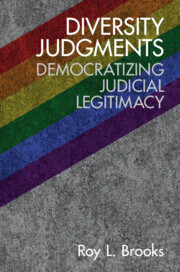Book contents
- Diversity Judgments
- Diversity Judgments
- Copyright page
- Dedication
- Contents
- Preface
- Acknowledgments
- Introduction
- Part I Asian Americans
- Part II African Americans
- Part III Women
- Part IV Latinx
- Part V Native Americans
- Part VI LGBTQ
- Part VII Intersectionality
- 16 EEOC v. Catastrophe Management Solutions Co. (Dreadlocks)
- 17 Kelo v. City of New London (Eminent Domain)
- Part VIII Outsiders v. Outsiders
- Part IX White Males
- Part X Situational Outsiders
- Index
16 - EEOC v. Catastrophe Management Solutions Co. (Dreadlocks)
from Part VII - Intersectionality
Published online by Cambridge University Press: 10 March 2022
- Diversity Judgments
- Diversity Judgments
- Copyright page
- Dedication
- Contents
- Preface
- Acknowledgments
- Introduction
- Part I Asian Americans
- Part II African Americans
- Part III Women
- Part IV Latinx
- Part V Native Americans
- Part VI LGBTQ
- Part VII Intersectionality
- 16 EEOC v. Catastrophe Management Solutions Co. (Dreadlocks)
- 17 Kelo v. City of New London (Eminent Domain)
- Part VIII Outsiders v. Outsiders
- Part IX White Males
- Part X Situational Outsiders
- Index
Summary
Title VII of the Civil Rights Act of 1964 is the most important employment discrimination law in the country. The Act makes it illegal for an employer to “refuse to hire … discharge … or otherwise … discriminate against any individual with respect to [an individual’s] compensation, terms, conditions, or privileges of employment, because of such individual’s race, color, religion, sex, or national origin.” To prove a Title VII violation, a plaintiff proceeds under a disparate treatment or disparate impact theory of liability.
- Type
- Chapter
- Information
- Diversity JudgmentsDemocratizing Judicial Legitimacy, pp. 379 - 401Publisher: Cambridge University PressPrint publication year: 2022

